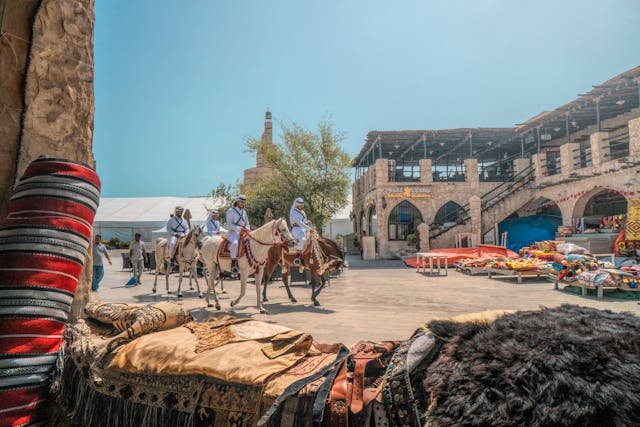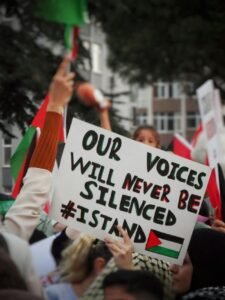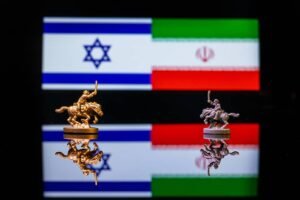It did not occur to the Palestinian resistance, as it embarked on the October 7th operation, that what the faction considered “sister Arab capitals” would deploy armies nor military campaigns to support it and its people in Palestine and Gaza. However, it certainly did not expect that the official Arab system would have reached this level of weakness and humiliation, approximately serving the goals of the Zionist war on Gaza, its people, and resistance.
One could think that the war reaching the stage of “ethnic cleansing” and “genocide” would be enough to move The Arab states, without “risking” entering a war adjusted to the “timing of resistance,” or “gambling” on opening the borders to supply arms and ammunition to the besieged sector, for example, like what the Western capitals did with Israel. Those powers put their foot extending to the eastern Mediterranean, building air and sea bridges, and opening the doors of their treasuries to the most extreme Israeli war government.
One could imagine at least that it was possible to imagine a scenario in which Arab governments would exhaust their diplomatic tools and activate the power of the cards they possess, at least to stop the waterfall of Palestinian blood. And to prevent Gaza’s cities, towns and residents from being wiped off the map.
It was possible to imagine a scenario in which countries that had signed peace treaties or achieved an “Abraham peace accord”, or had come a long way on this path, would call for an emergency meeting, in which those states would threaten to halt/freeze/suspend the implementation of these treaties and agreements within a week or two if Tel Aviv does not stop the war of encirclement and destruction that it has launched against the Gaza Strip. You would assume that these countries would at least summon the ambassadors of Israel to their capitals to at least reprimand them, not even expel them, close their embassies, or withdraw their ambassadors of these countries from Tel Aviv.
When the West bared its fangs and regained the old colonial image with all its rudeness and brutality, the “sister countries” could have played the game of “delaying” in receiving the Western envoys and messengers to their capitals, or restored to the tactic of “delaying” in concluding or implementing “billion-dollar deals” with its cross-border companies, at least to make this West feel that it also has strategic interests, with half a billion Arabs, that are perhaps much more important than the western interests with seven million Israeli, who was hit by religious and nationalist extremism, until it blinded their insight and vision. All of this, and much more, did not happen. Arab capitals continued to deal with Israel and its partners in crime based on: “Business as usual”.
Arab leaders and officials issued many statements of denunciation and condemnation at the beginning of the Israeli war on Gaza before they got tired of issuing more of them, due to their excessive issuance of “cut and paste” statements. As the weeks and months passed, they turned into political writers and analysts, creative in portraying the scale of the humanitarian catastrophe poured over the heads of the women and children of Gaza, and they tirelessly repeated their seemingly passionate calls to stop the massacre, prevent displacement, and bring in aid, among other things that have become hard to miss.
And when the voices of these states’ people were getting louder, echoing the suffering of the people of the Gaza Strip, and demanding the opening of the borders, the entry of aid, and the boycott and cutting of relations with Israel, the “king writers” in many of our Arab capitals were rushing to defend the king’s positions, resorting to the lie that maintaining relations with Israel is necessary to facilitate the smooth flow of power, aid to Gaza for those in need, and prevent civilians from dying. However, they failed in this and that. They failed when they were unable to implement the decision of their emergency Arab-Islamic summit to break the siege on Gaza, and they failed when they were unable to respond to the calls of their people and the people of Palestine.
After their “lack of resourcefulness” in opening the crossings, especially the Egyptian-Palestinian Rafah crossing and checkpoint, they refuged to the air, and the show of dropping aid from the sky on the hungry and sick in the northern Gaza Strip was the climax of the “drama of Arab impotence,” not just because it falls on three-Quarters of a million besieged Palesticvian was not enough, but because the people of Gaza had to pay 400 being killed and many times more wounded, waiting desperately for aid to drop from the sky. Let alone the dozens of deaths and wounded due to the “free fall” of this aid over their heads, which was a disaster for them and their families and loved ones.
Today, Arab countries are actively involved in the “Sea Corridor and the American Floating Bridge” project, as if they found something they lost after months of wandering, and without showing a single shred of respect for the minds of the citizens and the intelligence of public opinion in Palestine and “all the Arab countries are my homelands,” believers who looked at this tricky project with much doubt and mistrust, believing that what Yoav Gallant said about the IDF’s goals and objectives more than they listened to the Arab and Western media mouthpieces. They believed him when he said that his forces were “monitoring closely and not from a distance,” and that “The Corridor and the Bridge” were giant tools for creating a gap between the resistance and its civil foster and creating new dynamics that would end with eliminating “the Hamas government and its influence,” assuming that after six months of starvation and thirst war, whoever owns aid owns public opinion.
Without underestimating the importance of providing the people of the Gaza Strip with immediate and urgent aid and relief, anyone who closely monitors the motives of those who offer it, Arabs and Westerners, will inevitably conclude that most of these parties do so for political reasons in the first place, while a few of them do so for purely humanitarian reasons. This includes motives related to the “post-war on Gaza” projects, and the necessity of uprooting the notion of resistance as it witnesses the fall of the myths of Israeli superiority, an indication of the level of wear and tear that has befallen the official Arab system on the one hand, and the widening gap between its governments and their peoples on another. Some Western players are in search of a “fig leaf” to cover up their complicity in Israeli war crimes, and their loss of “soft power” that has always enabled them to prevail over their international opponents. Last but not least some with “necessities” related to the US presidential election campaign, in which the possibilities of Biden and his Democratic Party are shaken by the Israeli massacres against civilians in the Gaza Strip.
In conclusion, the official Arab body, which is concerned – in theory – more than others with the developments in Gaza and Palestine, failed to employ its diplomatic tools and pressure cards to stop the war of genocide and ethnic cleansing, and when this Arab system resorted to “relief diplomacy” rather than “The diplomacy relief” they failed, once again, to extend a real lifeline to more than two million Palestinians besieged by hunger and disease, putting aside the devastation and destruction caused by dropping the equivalent of six nuclear bombs (the weight of the Hiroshima bomb) on the heads of its children and women.
Marsh 2024









